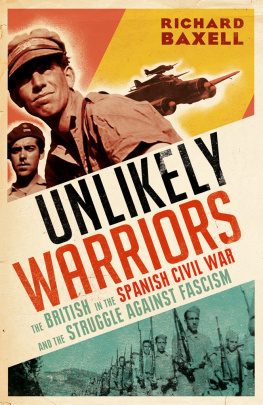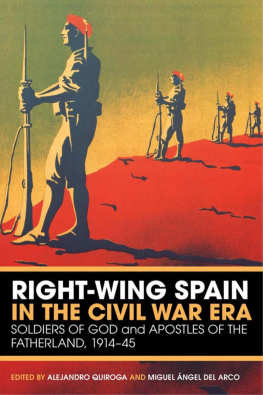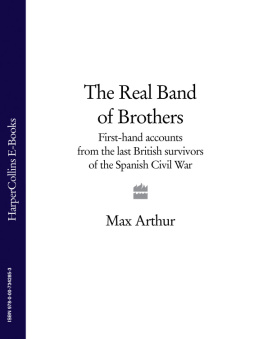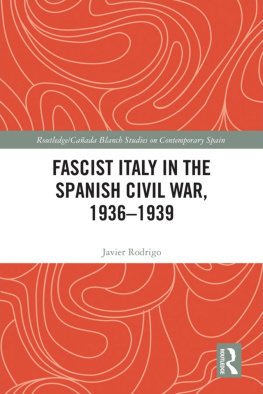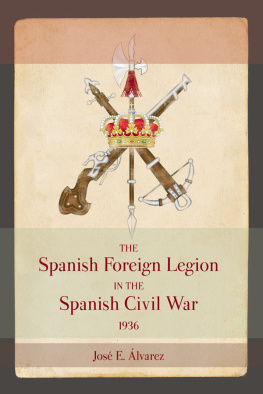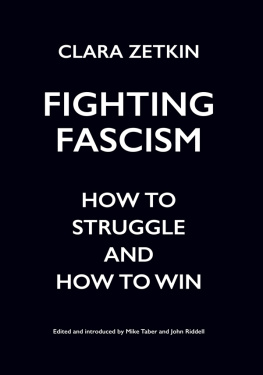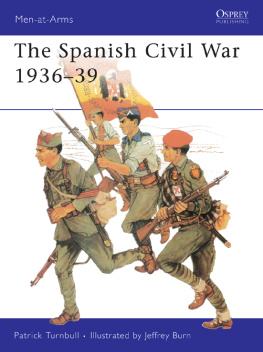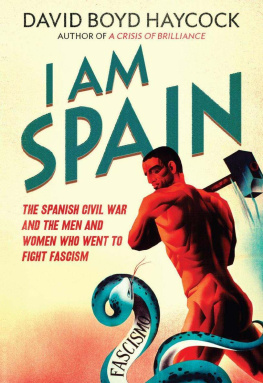Richard Baxell - Unlikely Warriors: The British in the Spanish Civil War and the Struggle Against Fascism
Here you can read online Richard Baxell - Unlikely Warriors: The British in the Spanish Civil War and the Struggle Against Fascism full text of the book (entire story) in english for free. Download pdf and epub, get meaning, cover and reviews about this ebook. year: 2012, publisher: Aurum Press, genre: Politics. Description of the work, (preface) as well as reviews are available. Best literature library LitArk.com created for fans of good reading and offers a wide selection of genres:
Romance novel
Science fiction
Adventure
Detective
Science
History
Home and family
Prose
Art
Politics
Computer
Non-fiction
Religion
Business
Children
Humor
Choose a favorite category and find really read worthwhile books. Enjoy immersion in the world of imagination, feel the emotions of the characters or learn something new for yourself, make an fascinating discovery.
- Book:Unlikely Warriors: The British in the Spanish Civil War and the Struggle Against Fascism
- Author:
- Publisher:Aurum Press
- Genre:
- Year:2012
- Rating:5 / 5
- Favourites:Add to favourites
- Your mark:
- 100
- 1
- 2
- 3
- 4
- 5
Unlikely Warriors: The British in the Spanish Civil War and the Struggle Against Fascism: summary, description and annotation
We offer to read an annotation, description, summary or preface (depends on what the author of the book "Unlikely Warriors: The British in the Spanish Civil War and the Struggle Against Fascism" wrote himself). If you haven't found the necessary information about the book — write in the comments, we will try to find it.
Richard Baxell: author's other books
Who wrote Unlikely Warriors: The British in the Spanish Civil War and the Struggle Against Fascism? Find out the surname, the name of the author of the book and a list of all author's works by series.
Unlikely Warriors: The British in the Spanish Civil War and the Struggle Against Fascism — read online for free the complete book (whole text) full work
Below is the text of the book, divided by pages. System saving the place of the last page read, allows you to conveniently read the book "Unlikely Warriors: The British in the Spanish Civil War and the Struggle Against Fascism" online for free, without having to search again every time where you left off. Put a bookmark, and you can go to the page where you finished reading at any time.
Font size:
Interval:
Bookmark:

For Robert and Mara
This book has taken several years to write. Without the support of my friends and family, it simply would not have been possible and several in particular have stoically endured my divided inattention. Thanks and apologies in equal measure go to my mother, the four girls, Sophie Charles and, above all, to Heather.
I owe a huge debt to Paul Preston, Britains foremost historian of modern Spain, who has always been as supportive as he has been inspirational. Many others too numerous to list have also given me the benefit of their invaluable time and advice, but special thanks must go to Michael Alpert, Jennifer Beamish, Melody Buckley, Peter Carroll, David Convery, Nigel Copsey, Ciaran Crossey, Stephen Dorril, Claudia Honefeld, Angela Jackson, Dan Kowalsky, David Leach, Alan Lloyd, Richard Lorch, Linda Palfreeman, Danny Payne, Rmi Skoutlesky, Phyll Smith, Peter Stansky, Boris Volodarsky, Don Watson, Bill Williams and Gerben Zagsma.
The committee and the membership of the International Brigade Memorial Trust were incredibly helpful and supportive, as were a number of veterans of the International Brigades and their families. I would like to extend a special thank you to the relatives of Andy Andrews, Edwin Bee, Freddie Brandler, Len Crome, Gerry Doran, Bob Doyle, Jack Edwards, Harry Fraser, Edwin Greening, Jack Jones, James Jump, Joseph Kahn, Sam Lesser, David Lomon, John Longstaff, Willy Maley, David Marshall, Max Nash, David Newman, Michael ORiordan, Jack Shaw, Fred Thomas, Miles Tomalin, Frank West, Sam Wild and Archie Williams.
Having spent time in a number of archives during my research, I would like to express my particular thanks to John Callow at the Marx Memorial Library, Alice Locke at the Tameside Local Studies Archive and Gail Malmgreen at the Tamiment Library. Thanks also to the staff of the Imperial War Museums film and sound archives, the Working Class Movement Library and the Peoples History Museum. Dolores Long, Hilary Jones and Rickard and Carol-Jeanette Jorgensen all very kindly provided me with very much more than just a place to stay during my research trips to Manchester and New York.
And last, but definitely not least, my thanks to Sam Harrison and Steve Gove at Aurum Press and Tom Buchanan, Jim Carmody and Helen Graham, all of whom devoted a considerable amount of time and effort in helping to eliminate any mistakes. Those that remain are, as they say, mine alone.
I sing of my comrades
That once did sing
In that great choir at Albacete
Before the battle. Rank after rank
Of the young battalions
Singing the Internationale
They came from every corner of the earth
So many men from distant lands
Each with his private history
Who took to arms in the defence
Of Spains Republic.
David Marshall, International Brigader and poet

On 9 June 2009, in the elegant surroundings of the Spanish Embassy in Londons Belgravia, a 94-year-old Briton stood up and, leaning on a stick for support, delivered a speech imbued with the passionate idealism of a man many years his junior. He spoke clearly and eloquently, in fluent Spanish, though an occasional catch in his voice betrayed the emotional intensity of the occasion. He told of his pleasure at being invited to the reception, but acknowledged sadness that so few of his friends and comrades were still alive to witness the event, citing the words from Laurence Binyons war poem, For the Fallen:
Age shall not weary them, nor the years condemn.
At the going down of the sun and in the morning, we will remember them.
As the speech drew to an end, the man raised his right arm in a clenched-fist salute, earning thunderous applause and cheers from the smartly dressed audience of well-wishers and representatives of the British and Spanish media. The gesture also provoked the return of the salute from one of his companions, sitting in pride of place at the front of the crowd.
The pensioners, six from Britain and one from Ireland, had been invited to the embassy that day to be formally presented with Spanish passports, symbols of an offer of citizenship from the countrys government. As the ambassador explained, the seven (the speaker, Sam Lesser, along with Thomas Watters, Lou Kenton, Joseph Kahn, Jack Edwards, Paddy Cochrane and Penny Feiwel nonagenarians all) were among the last survivors of the extraordinary men and women from Britain and Ireland who, seventy years earlier, had left their homes to go to Spain to fight for democracy and freedom as part of the International Brigades, the courageous band of volunteers from around the world who had fought on the side of the elected government in the Spanish Civil War of 19361939. The Brigaders sacrifices had earned the eternal gratitude of the Spanish Republicans, eloquently expressed by Dolores Ibrruri (the legendary orator from Asturias, known as La Pasionaria ) at a huge farewell parade held in Barcelona on 28 October 1938. We shall not forget you, she had assured them, promising that, one day, they would be welcomed back to a free, democratic Spain:
Those of you who have no country will find one, those of you deprived of friendship will find friends and all of you will find the love, affection and gratitude of the whole of the Spanish People.
There was to be a long wait for the fulfilment of that promise. The dictatorship of General Franco lasted for nearly forty years, ending only with his death on 20 November 1975. But after a surprisingly peaceful transition to democracy in 1977, free elections were held in Spain for the first time since February 1936. Five years later, the newly elected socialist government of Felipe Gonzlez, drawing on the memory of the defeated Second Republic of the 1930s, would decide to confer Spanish citizenship on all the surviving veterans of the International Brigades.
When the offer was first made on 26 January 1996, it came with a proviso: the veterans must renounce their own nationality. Despite the enthusiastic welcome they received on the homenaje , their return to Spain that year for the sixtieth anniversary of the war, few were prepared to consider this. It was not until the re-election of the Socialists, led by Jos Luis Zapatero, in 2007, that the Spanish parliament passed the Ley de la Memoria Histrica , of which Article 18 confirmed the right of the surviving veterans to Spanish citizenship without the need to renounce their current nationality. This finally allowed the government to fulfil La Pasionaria s promise, leading in turn to the poignant 2009 ceremony at which the Spanish Ambassador to Britain, Carles Casajuana, graciously assured the handful of survivors that Your efforts were not in vain. Your ideals are part of the foundations of our democracy in Spain today. His speech was received with gratitude and emotion by the veterans, who sat proudly clutching their new passports. Were a little late, admitted Sam Lesser, but today I believe we can say that we have come home.
*
The reasons that lay behind the momentous decision, all those years ago, And alongside the economic turmoil came a political storm, one that had been growing since the end of the First World War and now swept across Europe, attacking and unseating liberal and democratic regimes as it went.
The birth of Mussolinis fascist Italy in 1922 was followed by the establishment of dictatorships such as Antnio de Oliveira Salazars Estado Novo (New State) in Portugal. Hitlers ascent to the German chancellorship offered to him by an old guard of Prussian aristocrats in the mistaken belief that they had the power and authority to control him followed in 1933, and the destruction of the Austrian working-class movement by Engelbert Dolfusss austrofascist regime the next year continued the unrelenting attacks on the European left.
Font size:
Interval:
Bookmark:
Similar books «Unlikely Warriors: The British in the Spanish Civil War and the Struggle Against Fascism»
Look at similar books to Unlikely Warriors: The British in the Spanish Civil War and the Struggle Against Fascism. We have selected literature similar in name and meaning in the hope of providing readers with more options to find new, interesting, not yet read works.
Discussion, reviews of the book Unlikely Warriors: The British in the Spanish Civil War and the Struggle Against Fascism and just readers' own opinions. Leave your comments, write what you think about the work, its meaning or the main characters. Specify what exactly you liked and what you didn't like, and why you think so.

